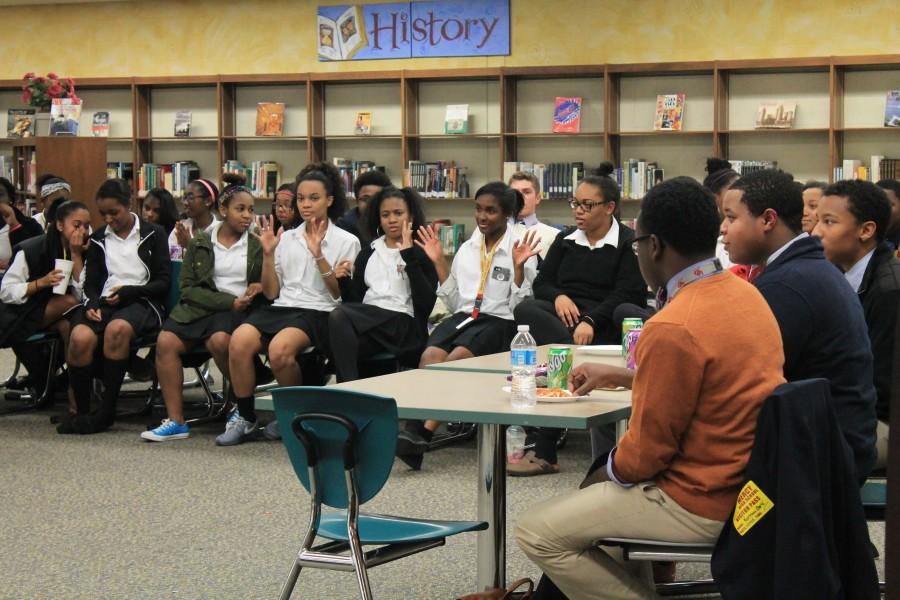BASE examines topic of being black in America
Mercy BASE discusses the implications of being an African American in the U.S. in joint forum with the University of Detroit.
A packed BASE (Black Awareness Society for Education) forum was held in the Mercy media center on Thursday. Vice president and senior Chanel Taylor kickstarted the conference by tapping on the shoulders of 9 U of D boys and signaling for them to stand in the corner. Secretary and senior Paisley Sutton questioned the crowd, asking why these boys might be standing on the far side of the room. A few guesses were made, until Sutton finally announced they had selected one-third of the boys who attended the conference as a representation of the fact that one-third of the black male population will be incarcerated at some point in their lives.
“For the black community, this means your grandfather, your brother, or you will be sent to jail,” said U of D BASE secretary Thomas Barrow. “It was a very powerful message.”
The Mercy BASE leaders chose the topic: being black in America. Discussions were posed regarding incarceration, economic discrimination, lack of political representation, and medical disadvantages of blacks.
One keynote slide analyzing the economic discrimination black Americans face presented a fact from a 2013 study: a white man with a criminal record was more likely to get a job than a black man without a criminal record and a four-year college degree.
“This fact was very appalling and struggling for me,” said BASE member senior Carmela Sleva.
BASE leaders also presented information stating 10.4% of blacks were receiving some type of government aid. Of that 10.4%, 23.7% had graduated from a four-year university, 15.4% possessed a bachelor’s degree, and 4.5% contained an advanced degree, such as a master’s or doctorate.
The forum was open to all BASE club members who had paid their dues and attended the informational meeting last Thursday. U of D also has a BASE club and the forum was open to their members as well. Twenty-eight U of D boys and 49 Mercy girls attended. Pizza, chips, and drinks were provided for all attendees.
Though the forum ran efficiently, it was difficult for the Mercy BASE leaders to coordinate the event. Mercy leaders had to not only get approval from Mercy and U of D administration, talk to their club moderators, convene with the U of D BASE board, and plan, but also choose a topic, collect dues, decide how many people were permitted to attend, and invite teachers.
“It was very hectic planning,” said BASE president senior Arin Bell.
The forum was seen as both educational and beneficial because students were able to see more than one gender’s perspective on these issues.
“I think overall it went really well,” said Sleva. “There were very diverse opinions and we created a space where people could not only freely express those opinions but also freely debate them. Especially here, it is good to have those different perspectives because those of different genders, even within the same race, experience different discrimination.”

